1/24/07
The Silver Sensor

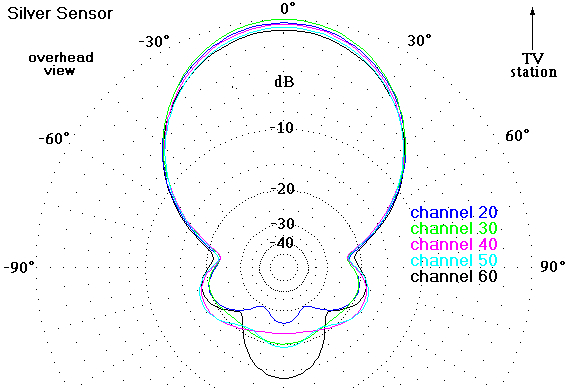
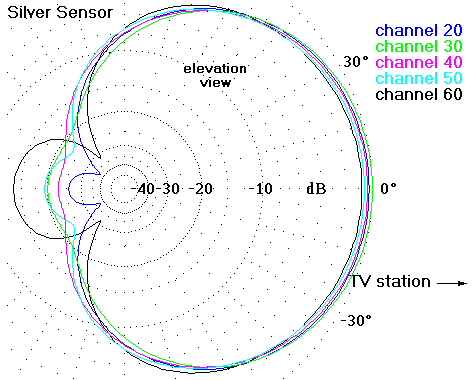
Zenith and others sell this
antenna. Zenith calls it the
ZHDTV1. This UHF Log-Periodic Dipole
Array is a very popular indoor antenna.
It looks good. If you don’t
think any antenna looks good then this is your antenna: It has high gain with minimal visual
impact. Reception out the back is very
weak, which may help in multi-path situations.
But because the designers chose to angle the elements back 15° (to give it an airplane look) there are no nulls at
+90° and –90°. Amazon.com,
Buy.com, Hififorless.com, knbelectronics.com, and many others sell the Silver
Sensor. Terk has a similar antenna that
also has rabbit ears for VHF.
Urban Ghosts (inner-city multi-path)
This is a particularly
vexing problem. The signal is strong,
but the DTV just won’t lock-on.
Multi-path is caused by reflections off of buildings and some
hills. These signals arrive late. On analog channels they appear as
ghosts. Actually all channels have
them. But unless the direct path is
blocked, they are usually too dim to see.
To determine if you are
haunted by these specters, observe analog channels, close in frequency, from
the same directions. If you see ghosts
that are more than very dim, then they are blocking your DTV reception. The ghosts are usually to the right of the
actors. (If any are to the left then a
reflection is stronger than the direct signal and you may benefit from pointing
the antenna at the reflection.) If
there is more than a faint trace of snow then you also need a bigger antenna.
Assuming little snow, your
first step is to acquire a Silver Sensor or a DB-2 antenna. While watching the analog station, try to
find a position that minimizes the ghosts and the snow. This will teach you what you need to know to
make the DTV station work. Search the
whole room, especially near windows facing the tower. Rotate the antenna while keeping in mind the overhead view
diagram above. The angle where a ghost
fades out will tell you the direction it is coming from.
If you still have no luck
getting a DTV lock then strong ghosts are arriving from the front. The following procedure may provide a
working solution. This procedure will
only work if there are one or at most two strong ghosts (and maybe a lot of
weak ones). If you have three or more strong
ghosts then your only hope is a long cable to a place more advantageous.
The
Two Antenna Trick (indoor version)
Acquire a second Silver
Sensor. Two identical antennas are
required. A desktop or other flat
surface will be required for them. The
desk to should not be up against a wall that the antennas have to point through. For the antennas to be equal they must be
away from other objects. Join them with
a 2-to-1 splitter and two identical short cables of about 2 or 3 feet :
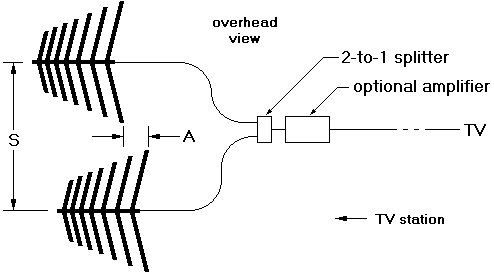
The radiation pattern for
the combined antennas has the same shape as for a single antenna, except now
there are a lot of nulls in the pattern.
The strategy is to make nulls coincide with the directions of the
ghosts.
Set the antennas beside each
other and pointing at the strongest signal.
Keep them parallel. The
separation distance (S) between the antennas determines how many nulls are in
the pattern :
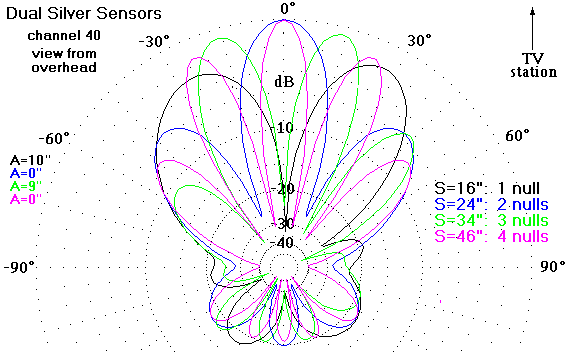
Moving one antenna slightly
ahead of the other (A) will rotate the nulls to the right or left in the
overall pattern :
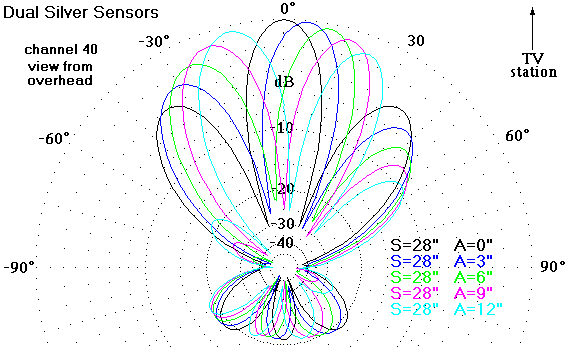
As you adjust A, you should see
each ghost dim and then re-intensify.
For your brightest ghost, go back to the dim spot. If it does not completely disappear, it is
because the antennas are no longer in equal strength fields. Rotating one of the antennas to reduce its
gain should make the cancellation complete.
There is a combination of S
and A that will make two ghosts go away.
You must search for it. Do this
first with an analog channel. If its
frequency is close to that of the DTV channel then a very similar S and A will
work for the digital channel. If there
is only one strong ghost then there is an S and A that will work for two
channels.
Don’t be too surprised if
you can’t get this to work. Canceling
two ghosts is difficult. The two
diagrams above assume both antennas are in identical fields. Indoors, this is seldom the case. If this system does work then all you have
to do is convince your wife to let you keep it.
There is an outdoor version
of the Two-Antenna
Trick.
This page is part of “An HDTV Primer”, which starts at www.hdtvprimer.com